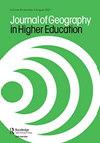Exploring the relation between spatial abilities and STEM expertise
IF 1.8
4区 教育学
Q2 EDUCATION & EDUCATIONAL RESEARCH
引用次数: 0
Abstract
ABSTRACTSmall-scale spatial abilities that involve the mental representation and transformation of two- and three-dimensional images and manipulation of objects at table-top have been studied extensively and are considered predictive of both interest and success in STEM disciplines. However, research investigating the relation of large-scale spatial abilities to STEM disciplines is sparse. The paper describes the design and implementation of a study for assessing individual differences (if any) in spatial abilities in both figural and environmental spaces between STEM experts (with over 10 years of experience) and non-experts (individuals without any studies in STEM fields). Participants’ performance in 16 small-, 10 large-scale tasks, and one self-assessment questionnaire at environmental scale was evaluated to assess their corresponding abilities. Results indicate differences between experts and non-experts, which are mostly highlighted for small-scale abilities where experts outperform non-experts. At large scale, some significant differences are identified, which also favor experts. Correlations among the variables tested provide evidence that different abilities are prominent between experts and non-experts.KEYWORDS: spatial abilitiessmall-scalelarge-scalesurveySTEM expertise AcknowledgementsThe authors would like to thank all individuals who participated in the study and Antonia Stavropoulou for local support. This work was supported by the Hellenic Foundation for Research and Innovation (H.F.R.I.) under the “First Call for H.F.R.I. Research Projects to support Faculty members and Researchers and the procurement of high-cost research equipment” under Grant [Project Number: HFRI-FM17-2661]; and the Erasmus+ Programme under Grant [Project Number: 2020-1-SE01-KA201-077972].Disclosure statementNo potential conflict of interest was reported by the author(s).Data availability statementThe survey data that support the findings of this study are openly available in figshare at https://doi.org/10.6084/m9.figshare.20401047.v4.Supplementary materialSupplemental data for this article can be accessed online at https://doi.org/10.1080/03098265.2023.2263735Additional informationFundingThis work was supported by the Erasmus+ Programme [Project Number: 2020-1-SE01-KA201-077972]; Hellenic Foundation for Research and Innovation (H.F.R.I.) [Project Number: HFRI-FM17-2661].探索空间能力与STEM专业知识之间的关系
涉及二维和三维图像的心理表征和转换以及桌面物体操作的小规模空间能力已经得到了广泛的研究,并被认为是STEM学科兴趣和成功的预测因素。然而,关于大尺度空间能力与STEM学科之间关系的研究很少。本文描述了一项研究的设计和实施,该研究用于评估STEM专家(拥有超过10年的经验)和非专家(没有任何STEM领域研究的个人)在数字和环境空间中的空间能力的个体差异(如果有的话)。测试了被试在16个小任务、10个大任务中的表现,以及在环境尺度上的一份自我评估问卷,以评估其相应的能力。结果表明专家和非专家之间存在差异,这主要体现在专家优于非专家的小规模能力上。在大范围内,发现了一些显著的差异,这也有利于专家。测试变量之间的相关性提供了证据,表明专家和非专家之间的能力差异是显著的。作者要感谢所有参与研究的个人和Antonia Stavropoulou的本地支持。这项工作得到了希腊研究与创新基金会(H.F.R.I.)在“H.F.R.I.研究项目的首次呼吁,以支持教师和研究人员以及高成本研究设备的采购”下的资助[项目编号:hfrii - fm17 -2661];项目编号:2020-1-SE01-KA201-077972。披露声明作者未报告潜在的利益冲突。数据可用性声明支持本研究结果的调查数据可在figshare中公开获取:https://doi.org/10.6084/m9.figshare.20401047.v4.Supplementary material本文的补充数据可在线访问:https://doi.org/10.1080/03098265.2023.2263735Additional informationfunding .本工作由Erasmus+计划支持[项目编号:2020-1-SE01-KA201-077972];希腊研究与创新基金会(H.F.R.I.)[项目编号:hri - fm17 -2661]。
本文章由计算机程序翻译,如有差异,请以英文原文为准。
求助全文
约1分钟内获得全文
求助全文
来源期刊

Journal of Geography in Higher Education
Multiple-
CiteScore
5.80
自引率
9.50%
发文量
29
期刊介绍:
The Journal of Geography in Higher Education ( JGHE) was founded upon the conviction that the development of learning and teaching was vitally important to higher education. It is committed to promote, enhance and share geography learning and teaching in all institutions of higher education throughout the world, and provides a forum for geographers and others, regardless of their specialisms, to discuss common educational interests, to present the results of educational research, and to advocate new ideas.
 求助内容:
求助内容: 应助结果提醒方式:
应助结果提醒方式:


